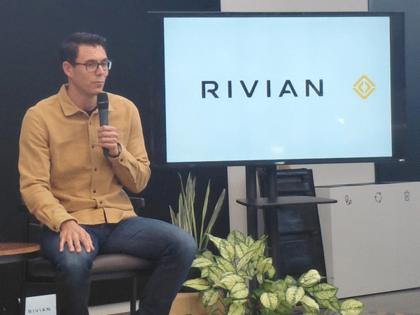CEO says software led Rivian west, and it's making EVs more affordable
Published in Business News
PLYMOUTH TOWNSHIP, Michigan — Accessing software talent was behind the decision of Rivian Automotive Inc. to move its headquarters from here to California, and that software now is what's contributing to more affordable vehicles, market appeal and at least one multi-billion-dollar deal with a legacy competitor, CEO RJ Scaringe said Monday.
The Irvine-based EV maker is facing some challenges as it looks forwarding to launching in the first half of next year its smaller R2 SUV set to start at $45,000. The federal tax credit for plug-in vehicles expired last week. President Donald Trump has increased tariffs on countries like South Korea from where Rivian gets batteries. Automakers producing lower-cost gas-powered vehicles won't face the penalties they once did under regulatory rollbacks on greenhouse gas emissions.
"For the longest time, in electrified space, there's been a singular set of great choices," Scaringe said before the Automotive Press Association at the company's development, prototyping and testing facility in Plymouth Township. "There's been the Tesla Model Y and the Tesla Model 3. ... It's remarkable that they maintained such extraordinary market share that they control about 50% of the (EV) sales in the United States.
"And that's not reflective of a market that has enough choice. That's reflective of a market that's been underserved with great choices. That's not to say there's not choices, but truly great choices, highly compelling, highly integrated choices. And so I think for the first time since the launch of the Model Y, you're going to have an alternative to Model Y that's incredibly comprehensive."
The R2 is "key" to the automaker's profitability, he said, since the average price of a full-size R1 truck and SUV is more than $90,000. The average cost of a new vehicle in the United States is close to $50,000. Rivian reported a net loss of $1.1 billion for the second quarter of 2025.
A big part of what makes the vehicle compelling, Scaringe said, is Rivian's software integration. Over years, traditional automakers increasingly computerized various parts of their vehicles, increasing the number of electronic control units often provided by suppliers. These computers control subsystems like seats, brakes and the engine, but with so many of them from various places, it makes it harder to update their software.
Rivian's vehicles include a zonal electrical architecture that has fewer ECUs, and the automaker owns its software stack. Its development entails a different kind of worker than automakers traditionally have needed to employ, Scaringe said. The company nearly a year ago upped a joint-venture deal to a value of $5.8 billion with Volkswagen AG, its second largest investor, to integrate Rivian's electrical architecture into VW vehicles as early as 2027.
"We're talking many thousands of dollars of cost saving by removing this heap of unnecessary ECUs," Scaringe said.
Rivian is open to other licensing deals but is focused on the VW partnership for now. One of the first vehicles from that will be the VW ID.1, an EV that's expected to start at $22,000 in Europe, Scaringe said.
"It's inconceivable to me that a car company can exist and maintain market share by 2035, and not have a software defined architecture," he said.
Right now, Tesla Inc., Rivian and several Chinese companies have this technology on the road, he said. General Motors Co. began rolling out a zonal electrical architecture in 2023 called its Ultifi platform, though it integrates with the vehicle's existing hardware, which includes many ECUs for different functions. Ford Motor Co. executives have said there will be fewer ECUs with its next-generation EVs, which are expected to start launching in 2027. Chrysler parent Stellantis NV's zonal architecture is its STLA Brain platform.
The development of the system and continuous updates require software engineers and developers more plentiful in Silicon Valley. That contributed to the decision by Rivian, which was founded in Scaringe's native Florida, to move its headquarters from Michigan in 2020.
"We found ourselves spending a lot of time in California, and those teams growing much more significantly than we have here," Scaringe said. "And so as the majority of the company started to be in California, we decided to move efficiently with headquarters to California."
Rivian's engineering workers total nearly 16,000 with most in California. It has roughly 1,000 employees in Michigan. The Plymouth facility includes powertrain testing, pre-production drive unit assembly, Midwest-based vehicle testing, virtual reality manufacturing station layout review, 3D printing and CNC machining for prototype parts and tools, and a call center. It also does testing of autonomous vehicles, where Scaringe said Rivian is investing more money than in any other category.
"We believe that by the end of this decade, by 2030," he said, "it will become essentially an expectation that the car can drive itself point to point with you in the car."
Scaringe said he's also been in conversation with the Trump administration about issues affecting the auto industry, including tariffs, though he hasn't spoken directly with the president. He emphasized that Rivian assembles all of its vehicles in Normal, Illinois, is building a plant in Georgia, and will source batteries for R2 from Arizona after LG Energy Solution launches production there in mid-2026.
"We're actually quite aligned with the administration," Scaringe said regarding domestic manufacturing, "and I would say the administration treats it as such now."
©2025 www.detroitnews.com. Visit at detroitnews.com. Distributed by Tribune Content Agency, LLC.












Comments